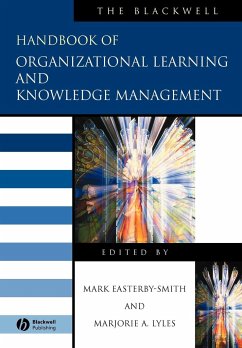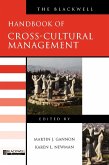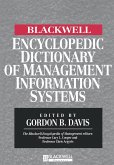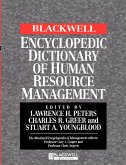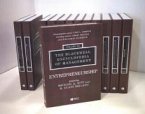The Blackwell Handbook of Organizational Learning and Knowledge Management
Herausgeber: Easterby-Smith, Mark; Lyles, Marjorie A
The Blackwell Handbook of Organizational Learning and Knowledge Management
Herausgeber: Easterby-Smith, Mark; Lyles, Marjorie A
- Broschiertes Buch
- Merkliste
- Auf die Merkliste
- Bewerten Bewerten
- Teilen
- Produkt teilen
- Produkterinnerung
- Produkterinnerung
This is the state-of-the-art, international handbook for a field of inquiry that is still emergent and yet occupies a central position in contemporary management and organization theory. Mark Easterby-Smith and Marjorie Lyles have drawn together in their authoritative reference work original essays from the leading scholars in organizational learning and knowledge management around the world. Not least in importance is the linkage they make between these two adjacent areas: learning and knowledge are often debated separately despite their close relationship. In this volume leading scholars…mehr
Andere Kunden interessierten sich auch für
![The Blackwell Handbook of Strategic Management The Blackwell Handbook of Strategic Management]() HITT MICHAEL A / FREEMAN RE R. EDWARD / HARRISON S JEFFREYThe Blackwell Handbook of Strategic Management48,99 €
HITT MICHAEL A / FREEMAN RE R. EDWARD / HARRISON S JEFFREYThe Blackwell Handbook of Strategic Management48,99 €![The Blackwell Handbook of Cross-Cultural Management The Blackwell Handbook of Cross-Cultural Management]() The Blackwell Handbook of Cross-Cultural Management184,99 €
The Blackwell Handbook of Cross-Cultural Management184,99 €![The Blackwell Encyclopedic Dictionary of Management Information Systems The Blackwell Encyclopedic Dictionary of Management Information Systems]() The Blackwell Encyclopedic Dictionary of Management Information Systems48,99 €
The Blackwell Encyclopedic Dictionary of Management Information Systems48,99 €![The Blackwell Encyclopedic Dictionary of International Management The Blackwell Encyclopedic Dictionary of International Management]() The Blackwell Encyclopedic Dictionary of International Management64,99 €
The Blackwell Encyclopedic Dictionary of International Management64,99 €![The Blackwell Encyclopedic Dictionary of Human Resource Management The Blackwell Encyclopedic Dictionary of Human Resource Management]() The Blackwell Encyclopedic Dictionary of Human Resource Management46,99 €
The Blackwell Encyclopedic Dictionary of Human Resource Management46,99 €![The Blackwell Handbook of Strategic Management The Blackwell Handbook of Strategic Management]() Michael HittThe Blackwell Handbook of Strategic Management174,99 €
Michael HittThe Blackwell Handbook of Strategic Management174,99 €![The Blackwell Encyclopedia of Management, 12 Volume Set The Blackwell Encyclopedia of Management, 12 Volume Set]() Chris Argyris / William Starbuck (eds.)The Blackwell Encyclopedia of Management, 12 Volume Set2.055,99 €
Chris Argyris / William Starbuck (eds.)The Blackwell Encyclopedia of Management, 12 Volume Set2.055,99 €-
-
-
This is the state-of-the-art, international handbook for a field of inquiry that is still emergent and yet occupies a central position in contemporary management and organization theory. Mark Easterby-Smith and Marjorie Lyles have drawn together in their authoritative reference work original essays from the leading scholars in organizational learning and knowledge management around the world. Not least in importance is the linkage they make between these two adjacent areas: learning and knowledge are often debated separately despite their close relationship. In this volume leading scholars from the fields of organizational learning, the learning organization, knowledge management and organizational knowledge, examine the issues and debates, as well as the processes and management implications, that are key to each of these approaches. The resulting set of essays offers researchers and students an invaluable guide. Tracing the roots of learning and knowledge debates across the disciplines of economics, psychology, and social theory, and charting the key contributions scholars have made, this is a major, in-depth overview which all scholars of organizational learning and knowledge management will need on their shelves.
Produktdetails
- Produktdetails
- Verlag: Wiley
- Seitenzahl: 698
- Erscheinungstermin: 19. August 2005
- Englisch
- Abmessung: 244mm x 170mm x 37mm
- Gewicht: 1183g
- ISBN-13: 9781405133043
- ISBN-10: 140513304X
- Artikelnr.: 22412811
- Herstellerkennzeichnung
- Libri GmbH
- Europaallee 1
- 36244 Bad Hersfeld
- gpsr@libri.de
- Verlag: Wiley
- Seitenzahl: 698
- Erscheinungstermin: 19. August 2005
- Englisch
- Abmessung: 244mm x 170mm x 37mm
- Gewicht: 1183g
- ISBN-13: 9781405133043
- ISBN-10: 140513304X
- Artikelnr.: 22412811
- Herstellerkennzeichnung
- Libri GmbH
- Europaallee 1
- 36244 Bad Hersfeld
- gpsr@libri.de
Mark Easterby-Smith is Associate Dean and Director of the Graduate Management School at Lancaster University. He was founder of the international journal Management Learning and is internationally renowned for his published work on organizational learning and management research methods. Currently he is Vice-Chair of the British Academy of Management. Marjorie A. Lyles is Professor of International Strategic Management and the Kimball Faculty Fellow at the Indiana University Kelley School of Business, USA. She has worked in Europe, China, and the USA, and published seminal articles in the Strategic Management Journal and Journal of Management Studies on strategy and learning. She is widely recognized for her contribution to the field.
List of Figures.
List of Tables.
List of Contributors.
Foreword: Karl E. Weick.
Part I: Disciplinary Perspectives:.
Introduction: Watersheds Of Organizational Learning And Knowledge
Management: Mark Easterby-Smith (Lancaster University)and Marjorie A. Lyles
(Indiana University).
1. Psychological Perspectives Underlying Theories of Organizational
Learning: Robert Defillippi (Suffolk University) and Suzyn Ornstein
(Suffolk University).
2. Social Learning Theory: Learning As Participation In Social Processes:
Bente Elkjaer (Danish University of Education).
3. The Role of Information and Communication Technologies In Knowledge
Management Initiatives: Niall Hayes (Lancaster University) and Geoff
Walsham (University of Cambridge).
4. Knowledge Management: What Can Organizational Economics Contribute?
Nicolai J. Foss (Copenhagen Business School) and Volker Mahnke (Copenhagen
Business School).
5. Knowledge Management: The Information Technology Dimension: Maryam Alavi
(Emory University) and Amrit Tiwana (Emory University).
Part II: Learning And Knowledge In Organizations:.
6. Organizational Learning And Knowledge Management: Toward An Integrative
Framework: Dusya Vera (University of Western Ontario) and Mary Crossan
(University of Western Ontario).
7. Organizations As Learning Portfolios: Anthony J. Dibella (East Greenwich
and Worcester Polytechnic Institute).
8. Framework For The Development of Communities Of Practice In A Corporate
Environment: Josh Plaskoff (Eli Lilly and Company).
9. Understanding Outcomes Of Organizational Learning Interventions: Amy C.
Edmondson (Harvard Business School) and Anita Williams Woolley (Harvard
Business School).
10. The Impact Of Intercultural Communication On Global Organizational
Learning: Sully Taylor (Portland State University), Joyce S. Osland
(Portland State University) and Dr Robert B. Pamplin.
11. Knowledge Seeking FDI And Learning Across Borders: Shige Makino
(Chinese University of Hong Kong) and Andrew C. Inkpen (American Graduate
School of International Management).
12. Beyond Alliances: Towards A Meta-Theory Of Collaborative Learning: Jane
E. Salk (University of Texas at Dallas)and Bernard L. Simonin (Tufts
University).
13. Knowledge Management And Competitive Advantage: Bala Chakravarthy
(IMD), Sue McEvily (University of Pittsburgh), Yves Doz (INSEAD) and Devaki
Rau (Northern Illinois University).
14. Absorptive Capacity: Antecedents, Models, And Outcomes: Frans A. J. Van
Den Bosch (Erasmus University Rotterdam), Raymond Van Wijk (Erasmus
University Rotterdam), and Henk W. Volberda (Erasmus University
Rotterdam),.
15. Narrative Knowledge In Action: Adaptive Abduction As A Mechanism For
Knowledge Creation And Exchange In Organizations: Caroline A. Bartel (New
York University) and Raghu Garud (New York University).
Part III: Organizational Knowledge And KM:.
16. Dominant Logic, Knowledge Creation, And Managerial Choice: Richard A.
Bettis (University of North Carolina at Chapel Hill) and Sze-Sze Wong (Duke
University).
17. Innovation And Knowledge Management: Scanning, Sourcing, And
Integration: Paul Almeida (Georgetown University), Anaupama Phene
(University of Utah), David Eccles & Rob Grant (Georgetown University).
18. Knowledge Sharing And The Communal Resource: Georg Von Krogh
(University of St Gallen).
19. Organizational Forgetting: Pablo Martin De Holan (University of
Alberta) and Faculté Saint-Jean.
20. Do We Really Understand Tacit Knowledge? Haridimos Tsoukas.
21. Knowledge And Networks: Raymond Van Wijk (Erasmus University
Rotterdam), Frans A. J. Van Den Bosch (Erasmus University Rotterdam), Henk
W. Volberda (Erasmus University Rotterdam).
22. The Political Economy Of Knowledge Markets In Organizations: Rob Cross
(University of Virginia) and Laurence Prusak (IBM Institute for
Knowledge-based Organizations).
23. Barriers To Creating Knowledge: Mikelle A. Calhoun (New York
University) and William H. Starbuck (New York University).
Part IV: Problematizing OL And Knowledge:.
24. Discourses of Knowledge Management And The Learning Organization: Their
Production And Consumption: Harry Scarbrough (University of Warwick).
25. Stickiness: Conceptualizing, Measuring, And Predicting Difficulties To
Transfer Knowledge Within Organizations: Gabriel Szulanski (University of
Pennsylvania) & Rossella Cappetta (Bocconi University).
26. Social Identity And Organizational Learning: John Child (University of
Birmingham) and Suzana Rodrigues (University of Birmingham).
27. Emotionalizing Organizational Learning: Stephen Fineman (University of
Bath).
28. Learning From Organizational Experience: John S. Carroll (MIT Sloan
School of Management), Jenny W. Rudolph (Boston College) and Sachi
Hatakenaka (MIT Sloan School of Management).
29. Deliberate Learning And The Evolution Of Dynamic Capabilities: Maurizio
Zollo (INSEAD)and Sidney G. Winter (University of Pennsylvania).
30. Semantic Learning As Change Enabler: Relating Organizational Identity &
Organizational Learning: Kevin G. Corley (Penn State University) & Dennis
A. Gioia (Penn State University).
31. Organizational Learning And Knowledge Management: Agendas For Future
Research: Marjorie A. Lyles (Indiana University) and Mark Easterby-Smith
(Lancaster University).
Index
List of Tables.
List of Contributors.
Foreword: Karl E. Weick.
Part I: Disciplinary Perspectives:.
Introduction: Watersheds Of Organizational Learning And Knowledge
Management: Mark Easterby-Smith (Lancaster University)and Marjorie A. Lyles
(Indiana University).
1. Psychological Perspectives Underlying Theories of Organizational
Learning: Robert Defillippi (Suffolk University) and Suzyn Ornstein
(Suffolk University).
2. Social Learning Theory: Learning As Participation In Social Processes:
Bente Elkjaer (Danish University of Education).
3. The Role of Information and Communication Technologies In Knowledge
Management Initiatives: Niall Hayes (Lancaster University) and Geoff
Walsham (University of Cambridge).
4. Knowledge Management: What Can Organizational Economics Contribute?
Nicolai J. Foss (Copenhagen Business School) and Volker Mahnke (Copenhagen
Business School).
5. Knowledge Management: The Information Technology Dimension: Maryam Alavi
(Emory University) and Amrit Tiwana (Emory University).
Part II: Learning And Knowledge In Organizations:.
6. Organizational Learning And Knowledge Management: Toward An Integrative
Framework: Dusya Vera (University of Western Ontario) and Mary Crossan
(University of Western Ontario).
7. Organizations As Learning Portfolios: Anthony J. Dibella (East Greenwich
and Worcester Polytechnic Institute).
8. Framework For The Development of Communities Of Practice In A Corporate
Environment: Josh Plaskoff (Eli Lilly and Company).
9. Understanding Outcomes Of Organizational Learning Interventions: Amy C.
Edmondson (Harvard Business School) and Anita Williams Woolley (Harvard
Business School).
10. The Impact Of Intercultural Communication On Global Organizational
Learning: Sully Taylor (Portland State University), Joyce S. Osland
(Portland State University) and Dr Robert B. Pamplin.
11. Knowledge Seeking FDI And Learning Across Borders: Shige Makino
(Chinese University of Hong Kong) and Andrew C. Inkpen (American Graduate
School of International Management).
12. Beyond Alliances: Towards A Meta-Theory Of Collaborative Learning: Jane
E. Salk (University of Texas at Dallas)and Bernard L. Simonin (Tufts
University).
13. Knowledge Management And Competitive Advantage: Bala Chakravarthy
(IMD), Sue McEvily (University of Pittsburgh), Yves Doz (INSEAD) and Devaki
Rau (Northern Illinois University).
14. Absorptive Capacity: Antecedents, Models, And Outcomes: Frans A. J. Van
Den Bosch (Erasmus University Rotterdam), Raymond Van Wijk (Erasmus
University Rotterdam), and Henk W. Volberda (Erasmus University
Rotterdam),.
15. Narrative Knowledge In Action: Adaptive Abduction As A Mechanism For
Knowledge Creation And Exchange In Organizations: Caroline A. Bartel (New
York University) and Raghu Garud (New York University).
Part III: Organizational Knowledge And KM:.
16. Dominant Logic, Knowledge Creation, And Managerial Choice: Richard A.
Bettis (University of North Carolina at Chapel Hill) and Sze-Sze Wong (Duke
University).
17. Innovation And Knowledge Management: Scanning, Sourcing, And
Integration: Paul Almeida (Georgetown University), Anaupama Phene
(University of Utah), David Eccles & Rob Grant (Georgetown University).
18. Knowledge Sharing And The Communal Resource: Georg Von Krogh
(University of St Gallen).
19. Organizational Forgetting: Pablo Martin De Holan (University of
Alberta) and Faculté Saint-Jean.
20. Do We Really Understand Tacit Knowledge? Haridimos Tsoukas.
21. Knowledge And Networks: Raymond Van Wijk (Erasmus University
Rotterdam), Frans A. J. Van Den Bosch (Erasmus University Rotterdam), Henk
W. Volberda (Erasmus University Rotterdam).
22. The Political Economy Of Knowledge Markets In Organizations: Rob Cross
(University of Virginia) and Laurence Prusak (IBM Institute for
Knowledge-based Organizations).
23. Barriers To Creating Knowledge: Mikelle A. Calhoun (New York
University) and William H. Starbuck (New York University).
Part IV: Problematizing OL And Knowledge:.
24. Discourses of Knowledge Management And The Learning Organization: Their
Production And Consumption: Harry Scarbrough (University of Warwick).
25. Stickiness: Conceptualizing, Measuring, And Predicting Difficulties To
Transfer Knowledge Within Organizations: Gabriel Szulanski (University of
Pennsylvania) & Rossella Cappetta (Bocconi University).
26. Social Identity And Organizational Learning: John Child (University of
Birmingham) and Suzana Rodrigues (University of Birmingham).
27. Emotionalizing Organizational Learning: Stephen Fineman (University of
Bath).
28. Learning From Organizational Experience: John S. Carroll (MIT Sloan
School of Management), Jenny W. Rudolph (Boston College) and Sachi
Hatakenaka (MIT Sloan School of Management).
29. Deliberate Learning And The Evolution Of Dynamic Capabilities: Maurizio
Zollo (INSEAD)and Sidney G. Winter (University of Pennsylvania).
30. Semantic Learning As Change Enabler: Relating Organizational Identity &
Organizational Learning: Kevin G. Corley (Penn State University) & Dennis
A. Gioia (Penn State University).
31. Organizational Learning And Knowledge Management: Agendas For Future
Research: Marjorie A. Lyles (Indiana University) and Mark Easterby-Smith
(Lancaster University).
Index
List of Figures.
List of Tables.
List of Contributors.
Foreword: Karl E. Weick.
Part I: Disciplinary Perspectives:.
Introduction: Watersheds Of Organizational Learning And Knowledge
Management: Mark Easterby-Smith (Lancaster University)and Marjorie A. Lyles
(Indiana University).
1. Psychological Perspectives Underlying Theories of Organizational
Learning: Robert Defillippi (Suffolk University) and Suzyn Ornstein
(Suffolk University).
2. Social Learning Theory: Learning As Participation In Social Processes:
Bente Elkjaer (Danish University of Education).
3. The Role of Information and Communication Technologies In Knowledge
Management Initiatives: Niall Hayes (Lancaster University) and Geoff
Walsham (University of Cambridge).
4. Knowledge Management: What Can Organizational Economics Contribute?
Nicolai J. Foss (Copenhagen Business School) and Volker Mahnke (Copenhagen
Business School).
5. Knowledge Management: The Information Technology Dimension: Maryam Alavi
(Emory University) and Amrit Tiwana (Emory University).
Part II: Learning And Knowledge In Organizations:.
6. Organizational Learning And Knowledge Management: Toward An Integrative
Framework: Dusya Vera (University of Western Ontario) and Mary Crossan
(University of Western Ontario).
7. Organizations As Learning Portfolios: Anthony J. Dibella (East Greenwich
and Worcester Polytechnic Institute).
8. Framework For The Development of Communities Of Practice In A Corporate
Environment: Josh Plaskoff (Eli Lilly and Company).
9. Understanding Outcomes Of Organizational Learning Interventions: Amy C.
Edmondson (Harvard Business School) and Anita Williams Woolley (Harvard
Business School).
10. The Impact Of Intercultural Communication On Global Organizational
Learning: Sully Taylor (Portland State University), Joyce S. Osland
(Portland State University) and Dr Robert B. Pamplin.
11. Knowledge Seeking FDI And Learning Across Borders: Shige Makino
(Chinese University of Hong Kong) and Andrew C. Inkpen (American Graduate
School of International Management).
12. Beyond Alliances: Towards A Meta-Theory Of Collaborative Learning: Jane
E. Salk (University of Texas at Dallas)and Bernard L. Simonin (Tufts
University).
13. Knowledge Management And Competitive Advantage: Bala Chakravarthy
(IMD), Sue McEvily (University of Pittsburgh), Yves Doz (INSEAD) and Devaki
Rau (Northern Illinois University).
14. Absorptive Capacity: Antecedents, Models, And Outcomes: Frans A. J. Van
Den Bosch (Erasmus University Rotterdam), Raymond Van Wijk (Erasmus
University Rotterdam), and Henk W. Volberda (Erasmus University
Rotterdam),.
15. Narrative Knowledge In Action: Adaptive Abduction As A Mechanism For
Knowledge Creation And Exchange In Organizations: Caroline A. Bartel (New
York University) and Raghu Garud (New York University).
Part III: Organizational Knowledge And KM:.
16. Dominant Logic, Knowledge Creation, And Managerial Choice: Richard A.
Bettis (University of North Carolina at Chapel Hill) and Sze-Sze Wong (Duke
University).
17. Innovation And Knowledge Management: Scanning, Sourcing, And
Integration: Paul Almeida (Georgetown University), Anaupama Phene
(University of Utah), David Eccles & Rob Grant (Georgetown University).
18. Knowledge Sharing And The Communal Resource: Georg Von Krogh
(University of St Gallen).
19. Organizational Forgetting: Pablo Martin De Holan (University of
Alberta) and Faculté Saint-Jean.
20. Do We Really Understand Tacit Knowledge? Haridimos Tsoukas.
21. Knowledge And Networks: Raymond Van Wijk (Erasmus University
Rotterdam), Frans A. J. Van Den Bosch (Erasmus University Rotterdam), Henk
W. Volberda (Erasmus University Rotterdam).
22. The Political Economy Of Knowledge Markets In Organizations: Rob Cross
(University of Virginia) and Laurence Prusak (IBM Institute for
Knowledge-based Organizations).
23. Barriers To Creating Knowledge: Mikelle A. Calhoun (New York
University) and William H. Starbuck (New York University).
Part IV: Problematizing OL And Knowledge:.
24. Discourses of Knowledge Management And The Learning Organization: Their
Production And Consumption: Harry Scarbrough (University of Warwick).
25. Stickiness: Conceptualizing, Measuring, And Predicting Difficulties To
Transfer Knowledge Within Organizations: Gabriel Szulanski (University of
Pennsylvania) & Rossella Cappetta (Bocconi University).
26. Social Identity And Organizational Learning: John Child (University of
Birmingham) and Suzana Rodrigues (University of Birmingham).
27. Emotionalizing Organizational Learning: Stephen Fineman (University of
Bath).
28. Learning From Organizational Experience: John S. Carroll (MIT Sloan
School of Management), Jenny W. Rudolph (Boston College) and Sachi
Hatakenaka (MIT Sloan School of Management).
29. Deliberate Learning And The Evolution Of Dynamic Capabilities: Maurizio
Zollo (INSEAD)and Sidney G. Winter (University of Pennsylvania).
30. Semantic Learning As Change Enabler: Relating Organizational Identity &
Organizational Learning: Kevin G. Corley (Penn State University) & Dennis
A. Gioia (Penn State University).
31. Organizational Learning And Knowledge Management: Agendas For Future
Research: Marjorie A. Lyles (Indiana University) and Mark Easterby-Smith
(Lancaster University).
Index
List of Tables.
List of Contributors.
Foreword: Karl E. Weick.
Part I: Disciplinary Perspectives:.
Introduction: Watersheds Of Organizational Learning And Knowledge
Management: Mark Easterby-Smith (Lancaster University)and Marjorie A. Lyles
(Indiana University).
1. Psychological Perspectives Underlying Theories of Organizational
Learning: Robert Defillippi (Suffolk University) and Suzyn Ornstein
(Suffolk University).
2. Social Learning Theory: Learning As Participation In Social Processes:
Bente Elkjaer (Danish University of Education).
3. The Role of Information and Communication Technologies In Knowledge
Management Initiatives: Niall Hayes (Lancaster University) and Geoff
Walsham (University of Cambridge).
4. Knowledge Management: What Can Organizational Economics Contribute?
Nicolai J. Foss (Copenhagen Business School) and Volker Mahnke (Copenhagen
Business School).
5. Knowledge Management: The Information Technology Dimension: Maryam Alavi
(Emory University) and Amrit Tiwana (Emory University).
Part II: Learning And Knowledge In Organizations:.
6. Organizational Learning And Knowledge Management: Toward An Integrative
Framework: Dusya Vera (University of Western Ontario) and Mary Crossan
(University of Western Ontario).
7. Organizations As Learning Portfolios: Anthony J. Dibella (East Greenwich
and Worcester Polytechnic Institute).
8. Framework For The Development of Communities Of Practice In A Corporate
Environment: Josh Plaskoff (Eli Lilly and Company).
9. Understanding Outcomes Of Organizational Learning Interventions: Amy C.
Edmondson (Harvard Business School) and Anita Williams Woolley (Harvard
Business School).
10. The Impact Of Intercultural Communication On Global Organizational
Learning: Sully Taylor (Portland State University), Joyce S. Osland
(Portland State University) and Dr Robert B. Pamplin.
11. Knowledge Seeking FDI And Learning Across Borders: Shige Makino
(Chinese University of Hong Kong) and Andrew C. Inkpen (American Graduate
School of International Management).
12. Beyond Alliances: Towards A Meta-Theory Of Collaborative Learning: Jane
E. Salk (University of Texas at Dallas)and Bernard L. Simonin (Tufts
University).
13. Knowledge Management And Competitive Advantage: Bala Chakravarthy
(IMD), Sue McEvily (University of Pittsburgh), Yves Doz (INSEAD) and Devaki
Rau (Northern Illinois University).
14. Absorptive Capacity: Antecedents, Models, And Outcomes: Frans A. J. Van
Den Bosch (Erasmus University Rotterdam), Raymond Van Wijk (Erasmus
University Rotterdam), and Henk W. Volberda (Erasmus University
Rotterdam),.
15. Narrative Knowledge In Action: Adaptive Abduction As A Mechanism For
Knowledge Creation And Exchange In Organizations: Caroline A. Bartel (New
York University) and Raghu Garud (New York University).
Part III: Organizational Knowledge And KM:.
16. Dominant Logic, Knowledge Creation, And Managerial Choice: Richard A.
Bettis (University of North Carolina at Chapel Hill) and Sze-Sze Wong (Duke
University).
17. Innovation And Knowledge Management: Scanning, Sourcing, And
Integration: Paul Almeida (Georgetown University), Anaupama Phene
(University of Utah), David Eccles & Rob Grant (Georgetown University).
18. Knowledge Sharing And The Communal Resource: Georg Von Krogh
(University of St Gallen).
19. Organizational Forgetting: Pablo Martin De Holan (University of
Alberta) and Faculté Saint-Jean.
20. Do We Really Understand Tacit Knowledge? Haridimos Tsoukas.
21. Knowledge And Networks: Raymond Van Wijk (Erasmus University
Rotterdam), Frans A. J. Van Den Bosch (Erasmus University Rotterdam), Henk
W. Volberda (Erasmus University Rotterdam).
22. The Political Economy Of Knowledge Markets In Organizations: Rob Cross
(University of Virginia) and Laurence Prusak (IBM Institute for
Knowledge-based Organizations).
23. Barriers To Creating Knowledge: Mikelle A. Calhoun (New York
University) and William H. Starbuck (New York University).
Part IV: Problematizing OL And Knowledge:.
24. Discourses of Knowledge Management And The Learning Organization: Their
Production And Consumption: Harry Scarbrough (University of Warwick).
25. Stickiness: Conceptualizing, Measuring, And Predicting Difficulties To
Transfer Knowledge Within Organizations: Gabriel Szulanski (University of
Pennsylvania) & Rossella Cappetta (Bocconi University).
26. Social Identity And Organizational Learning: John Child (University of
Birmingham) and Suzana Rodrigues (University of Birmingham).
27. Emotionalizing Organizational Learning: Stephen Fineman (University of
Bath).
28. Learning From Organizational Experience: John S. Carroll (MIT Sloan
School of Management), Jenny W. Rudolph (Boston College) and Sachi
Hatakenaka (MIT Sloan School of Management).
29. Deliberate Learning And The Evolution Of Dynamic Capabilities: Maurizio
Zollo (INSEAD)and Sidney G. Winter (University of Pennsylvania).
30. Semantic Learning As Change Enabler: Relating Organizational Identity &
Organizational Learning: Kevin G. Corley (Penn State University) & Dennis
A. Gioia (Penn State University).
31. Organizational Learning And Knowledge Management: Agendas For Future
Research: Marjorie A. Lyles (Indiana University) and Mark Easterby-Smith
(Lancaster University).
Index

